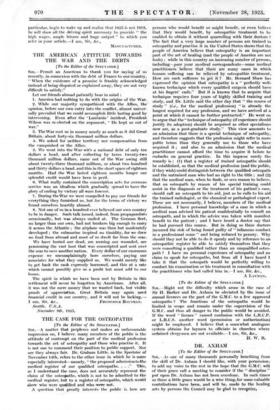THE AMERICAN ATTITUDE TOWARDS - THE WAR AND THE DEBTS
[To the Editor of the SracrAron.] SIR,—Permit an American to thank you for saying. of us recently, in connexion with the debt of France to our :country,
When the existence of a promise is frankly acknowledged instead of being disputed or explained away, they are not very` difficult to satisfy."
Let our friends abroad patiently bear in mind : 1. America had nothing to do with the origins of the War.
2. While our majority sympathized with the Allies, the" opinion, before our own entry into the conflict, almost univer- sally prevailed that we could accomplish little lasting good by - intervening. Even after the Lusitania ' incident, President: Wilson was re-elected on the argument, " He kept us out of war."
3. The War cost us in money nearly as much as it did Great Britain, about forty-six thousand million dollars.
4. We asked for neither territory nor compensation from - the vanquished or the Allies. ..
5. We went into the War with a national debt of only ten dollars a head, and after collecting by taxes twenty-two thousand million dollars, came out of the War owing still about twenty-three thousand millions, or about two hundred and thirty dollars a head, and this in the short space of eighteen months. Had the War lasted eighteen months longer our splendid credit would have been in peril.
6. What really sustained the conscription acts for overseas service was an idealism which gradually spread to have the glory of ending by victory all wars forever.
7. During the War we were compelled to pay our friends for everything they furnished us, but for the terms of victory we found ourselves heartily abused.
8. Not one of us in a hundred ever believed our own country to be in danger. Such talk issued, indeed, from propagandists occasionally, but was always smiled at. The German fleet, no larger than our own, had not bunkers big enough to carry it across the Atlantic ; the airplane was then but moderately developed ; the submarine inspired no timidity, for we drew no food from abroad and most of us dwelt far from the seas.
We have buried our dead, are nursing our wounded, are pensioning the vast host that was conscripted and sent over the seas to save another nation. Every dollar of our enormous expense we uncomplainingly bore ourselves, paying our associates for what they supplied us. We would merely like to get back the cash expressly borrowed, and this at a rate which cannot possibly give us a profit but must add to our losses.
The spirit in which we have been met by Britain in this settlement will never be forgotten by Americans. After all, it was not the mere money that we wanted back, but visible proofs of appreciation. Great Britain may again need financial credit in our country, and it will not be lacking.— November 9th, 1925.






















































 Previous page
Previous page